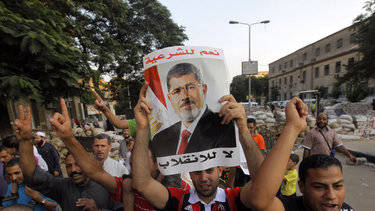World leaders, including the US, EU and the UN, have condemned the bloody security crackdown on anti-military protesters in the Egyptian capital, Cairo, in which more than 300 people have been killed and hundreds injured.
United States
US Secretary of State John Kerry said the escalating violence had dealt a "serious blow'' to political reconciliation efforts between the military-backed interim government and Morsi's supporters.
"This is a pivotal moment for all Egyptians,'' Kerry said. "The path toward violence leads only to greater instability, economic disaster and suffering.''
European Union
The bloc's foreign policy chief, Catherine Ashton, "strongly condemned'' the violence and called for Egypt's security forces to "exercise utmost restraint''.
"Only a concerted effort by all Egyptians and the international community might lead the country back on a path to inclusive democracy, and overcome Egypt's challenges,'' she said.
Turkey
Turkey's government harshly criticised the crackdown, with Prime Minister Recep Tayyip Erdogan's office calling the violence "a serious blow to the hopes of a return to democracy''.
It also blamed other unnamed countries for encouraging the government after Morsi's ouster on July 3.
Turkish President Abdullah Gul warned that Egypt could descend into chaos, comparing the clashes to the crackdown in Syria that precipitated a civil war.
United Nations
Secretary-General Ban Ki-moon denounced the violence and regretted that Egyptian authorities chose to use force to respond to the demonstrations.
Ban is "well aware that the vast majority of the Egyptian people want their country to go forward peacefully in an Egyptian-led process towards prosperity and democracy,'' according to a statement from his office.
Ban urged all Egyptians to focus on reconciliation.
Hamas
The Hamas-run government in Gaza condemned the "use of force and bloodshed'' in Egypt. In a short statement, Hamas said authorities should use "peaceful political solutions'' in dealing with the crisis.
Tunisia
Rachid Ghannouchi, president of Tunisia's governing moderate Islamist party Ennahda, called the crackdown an "abject crime''.
He expressed solidarity with the pro-Morsi backers' bid to "recover their freedom and oppose the coup d'etat''.
The ouster in 2011 of Tunisia's leader, Zine El Abidine Ben Ali, triggered the Arab Spring, which spread to Egypt.
Germany
German Foreign Minister Guido Westerwelle said the government was "extremely worried'' about the "very dangerous'' escalation of violence, indirectly criticising the leadership for its crackdown.
Chancellor Angela Merkel's spokesperson, Steffen Seibert, said the "decisive principle'' must be "that the human rights of all Egyptians, independent of their political direction and conviction, have to be respected and protected.''
Jordan
Jordan's Muslim Brotherhood has urged its Egyptian peers to continue protests, saying their victory will help the group rise to power elsewhere in the Arab world.
The Brotherhood's political arm, the Islamic Action Front, also warned Egypt's military rulers they have fallen into a "conspiracy'' hatched by the US and Israel to weaken Muslims.
Brotherhood protesters staged a protest outside the Egyptian Embassy in Amman and rebuked Egypt's military rulers as a "tool for corrupt and tyrant military regimes".
Britain
British Prime Minister David Cameron said the violence is "not going to solve anything".
"What is required in Egypt is a genuine transition to a genuine democracy. That means compromise from all sides,'' he said.
Cameron added that he was sorry to hear about the death of Sky News cameraman Mick Deane in the violence, saying his thoughts are with Deane's family and friends.
"It is essential that cameramen are in places like Egypt because otherwise none of us would know what is happening.''
France
France demanded an "immediate end to the repression," condemning the "the bloody violence" in unusually strong language.
Foreign Minister Laurent Fabius said an "urgent international position'' reflecting this must be reached, and called on Ban and Paris' main partners to contribute.
"The current situation will not be resolved by force,'' a statement from Fabius said. He called on all sides to "without delay open a dialogue that includes all Egyptian political forces to find a democratic end to this grave crisis''.
The minister said France was immediately available to help bring sides together.
Kuwait
Hundreds of people demonstrated against Egypt clearing the sit-in protests, chanting slogans against military leader General Abdel-Fattah el-Sissi, who led the coup against Morsi's government.
One cleric urged Kuwaiti citizens to demonstrate on Friday outside of the US Embassy over the violence in Egypt.
Kuwait's government previously pledged an aid package worth $4bn to Egypt following the ouster of Morsi.
Italy
Italian Foreign Minister Emma Bonino appealed to all sides in Egypt to do what they can to immediately stop the explosion of violence and "avoid a bloodbath".
She added that it was essential that security forces "exercise maximum self-control; likewise, everyone must avoid every incitement to violence''.
Qatar
Qatar said it "strongly condemns'' the violence in Egypt.
The Foreign Affairs Ministry urged Egyptian authorities to refrain from security crackdowns on demonstrations.
It also said the best way out of the crisis is through peaceful dialogue.
PHOTO CAPTION
Supporters of Egypt's ousted President Mohammed Morsi walk through makeshift barriers, Egypt, Saturday, Aug. 10, 2013.
Al-Jazeera


 Home
Home Discover Islam
Discover Islam Quran Recitations
Quran Recitations Lectures
Lectures
 Fatwa
Fatwa Articles
Articles Fiqh
Fiqh E-Books
E-Books Boys & Girls
Boys & Girls  Articles
Articles










